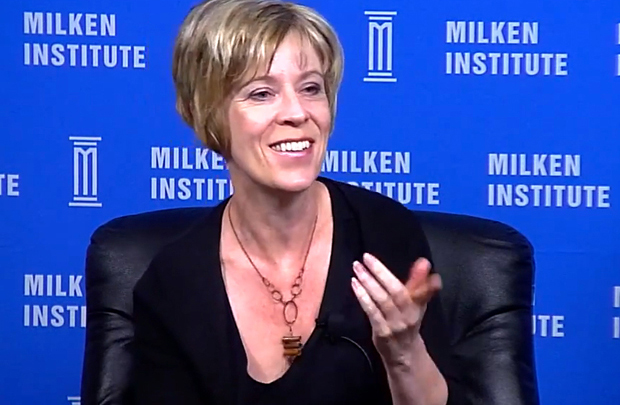What do former British Prime Minister Tony Blair and singer Will.i.am have in common? They both attended this year’s Milken Institute Global Conference, where USC Stem Cell researchers offered an exciting glimpse into the future of regenerative medicine.
Held from April 27 – 30 in Beverly Hills, the conference brought together leaders in the fields of science, health, government, finance, entertainment and philanthropy from more than 50 nations. A nonprofit, nonpartisan think tank, the Milken Institute aims to solve urgent social and economic challenges and improve lives.
During a panel session about regenerative medicine, Paula Cannon, PhD — associate professor at the Keck School of Medicine and principal investigator with USC Stem Cell — talked about genetically modifying hematopoietic or blood-forming stem cells to cure HIV/AIDS.
Her innovative approach is inspired by the “Berlin patient,” a man cured of both HIV and leukemia through a bone marrow transplant from a donor with a mutation in a gene called CCR5 that confers natural immunity to HIV. The first human clinical trials will take place in late 2014 in collaboration with the City of Hope and Sangamo BioSciences.
She also emphasized the recent progress made in the field of stem cell biology as a whole.
“In 10 years, we’ve been doing really good science,” she said. “This is going to provide amazing and different ways to treat diseases.”
One such way might be through fasting, according to preliminary date from Valter Longo, PhD, professor of gerontology and principal investigator with USC Stem Cell. He shared evidence that fasting “turns on” hematopoietic stem cells, which can regenerate the immune system and possibly protect against cancers. Fasting also appears to encourage neural stem cells to regenerate, protecting against the progression of Alzheimer’s disease.
Other USC faculty members who presented at the conference included Pinchas Cohen, MD, USC Stem Cell principal investigator and dean of the USC Davis School of Gerontology; former Los Angeles mayor Antonio Villaraigosa, professor of the practice of policy at the USC Price School of Public Policy; and Willow Bay, incoming director of the School of Journalism at the USC Annenberg School for Communication and Journalism.
Blair called the conference an opportunity to “get an extraordinary sense of what is possible, not just in the intellectual sphere, but in the practical sphere of how you make the world a different and better place.”
—Cristy Lytal


